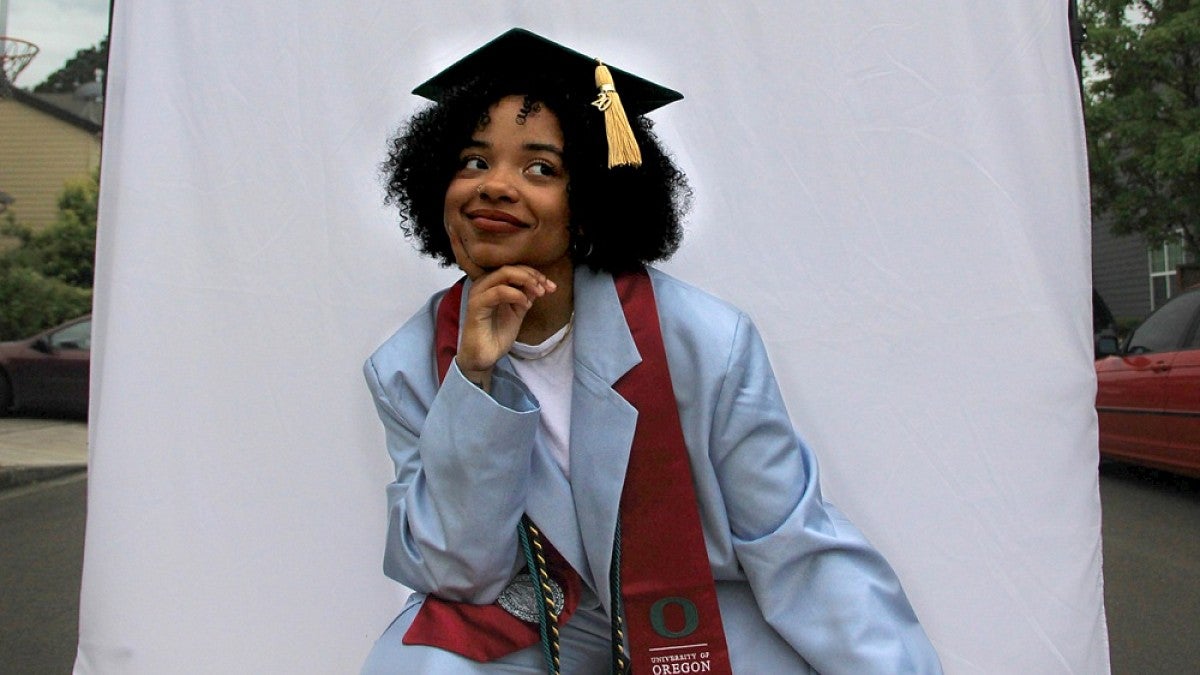As a student in the University of Oregon’s School of Journalism and Communication, Jasmine Jackson found her voice and discovered a passion for videography.
The creator of video projects such as “Ethnic Hair Day at UO” and “Home for the Black and Educated,” she was reporting on campus issues of race, equity and inclusion long before the current headlines.
“So often, when people think of Black people within a predominantly white institution, they imagine that everyone has the same experience,” Jackson said. “But the Black experience is not monolithic.”
A member of the Class of 2020, Jackson now works with Oregon Public Broadcasting through a prestigious Snowden internship. She describes herself as “Black, queer and a first-generation college student.”
The intersections of all these identities have been instrumental in shaping her personal development, her educational pathway and her career goals. She sees Pride Month as a great opportunity to celebrate one aspect of her identity, but it’s also an important reminder that one aspect is never sufficient for understanding a whole person — not even oneself.
“The word ‘pride’ never sat entirely comfortably with me,” she said. “In my coming-out stage, in my very underdeveloped queer head, I always thought of pride as a term that meant white folks’ comfortability being queer. But that doesn’t look the same for me. So now when I think of pride, I think of the Black transwomen in the Stonewall Riots in New York that really made pride what it is.”
The Stonewall Riots were in 1969. Jackson recently graduated in a year that is similarly marked with social protests. She believes it’s not only inevitable that the activism would reach campus, but in some ways, it’s long overdue.
“I’m glad that folks are honing in and focusing on these issues, and for some it’s been eye-opening,” she said. “But on the same note I wonder, what took so long? To me it seems like, prior to this moment, it’s all been a choice: It’s been a choice not to read the history, it’s been a choice not to say Black people’s names, it’s been a choice not to take action. There are things I wouldn’t change about my time at the UO, but if there’s one thing I could change, it would be our campus having some of these conversations far earlier.”
Looking ahead to her professional life, Jackson said that, along with the education she received in her classes and mentorship from inspiring professors like Ed Madison, her student job providing communications support for the Division of Equity and Inclusion was valuable preparation.
“From the first time we met, I thought my boss, tova stabin, was authentic,” she said. “I never felt I had to compromise my values or diminish myself in the workplace. That was important to me.”
Jackson credits fellow students as most instrumental in helping her to find her community at the UO. On first impression, her dorm seemed very white, but older students of color soon reached out to help her get acquainted with the college experience. They also introduced her to campus organizations like the Black Student Union and Black Women of Achievement.
“Institutionally, there is a lot of need for finding your space of comfort. There are aspects of my queerness that I can’t really discuss in a Black space the same way I would in a queer space. On that same token, if I’m in a queer space, they shy away from Blackness.”
While she lauds many people and organizations in the UO community for providing support throughout her educational journey, Jackson also would advise new college students to take an active role in finding and creating their own spaces.
“Through my craft of storytelling is where I really found my comfort,” she said. “I could talk about my experiences through my craft, and I found folks aligned with my experiences who would also speak on their own behalf.”
—By Jason Stone, University Communications


